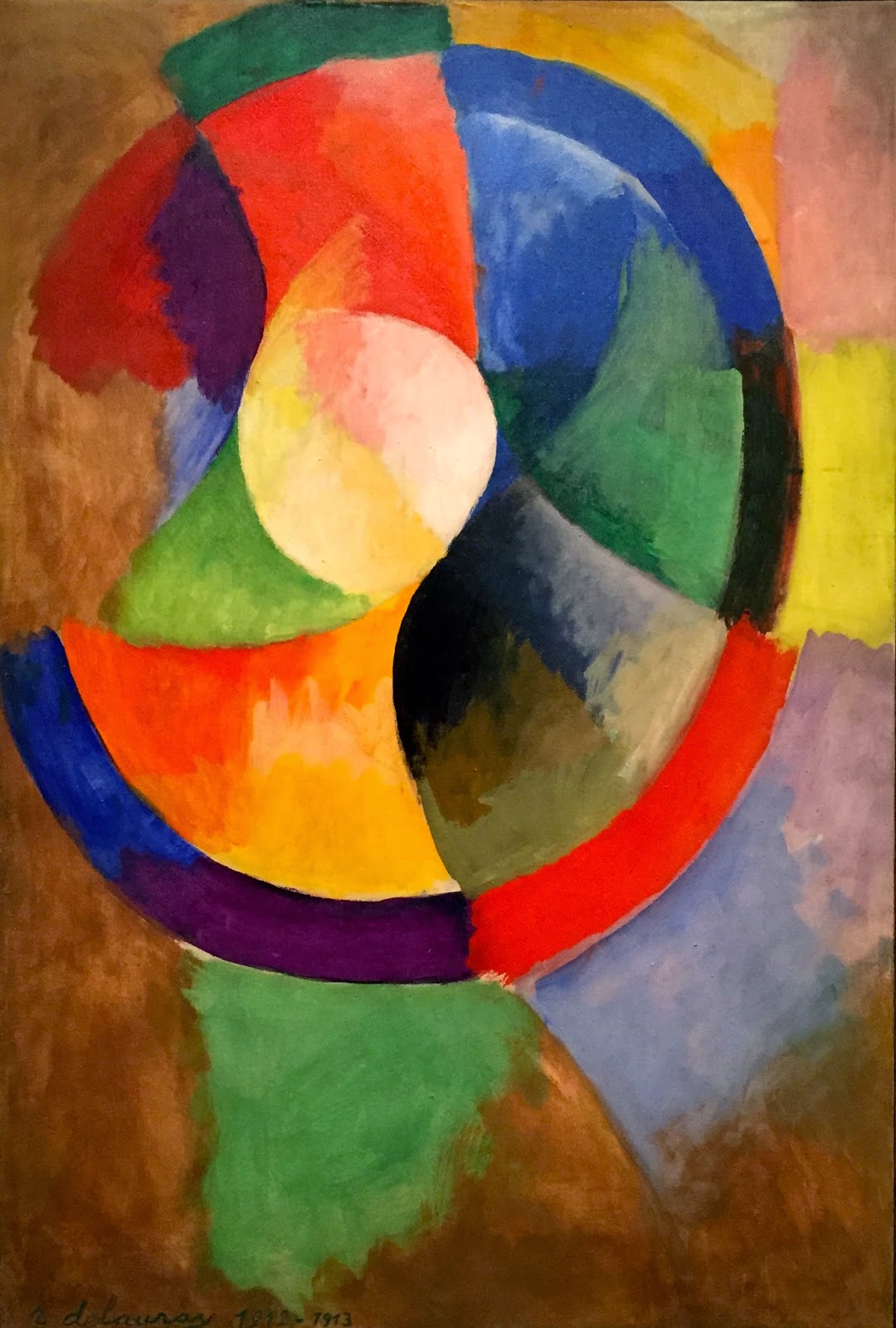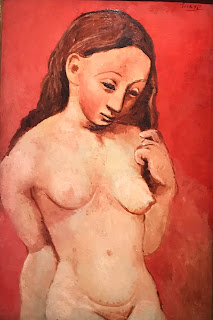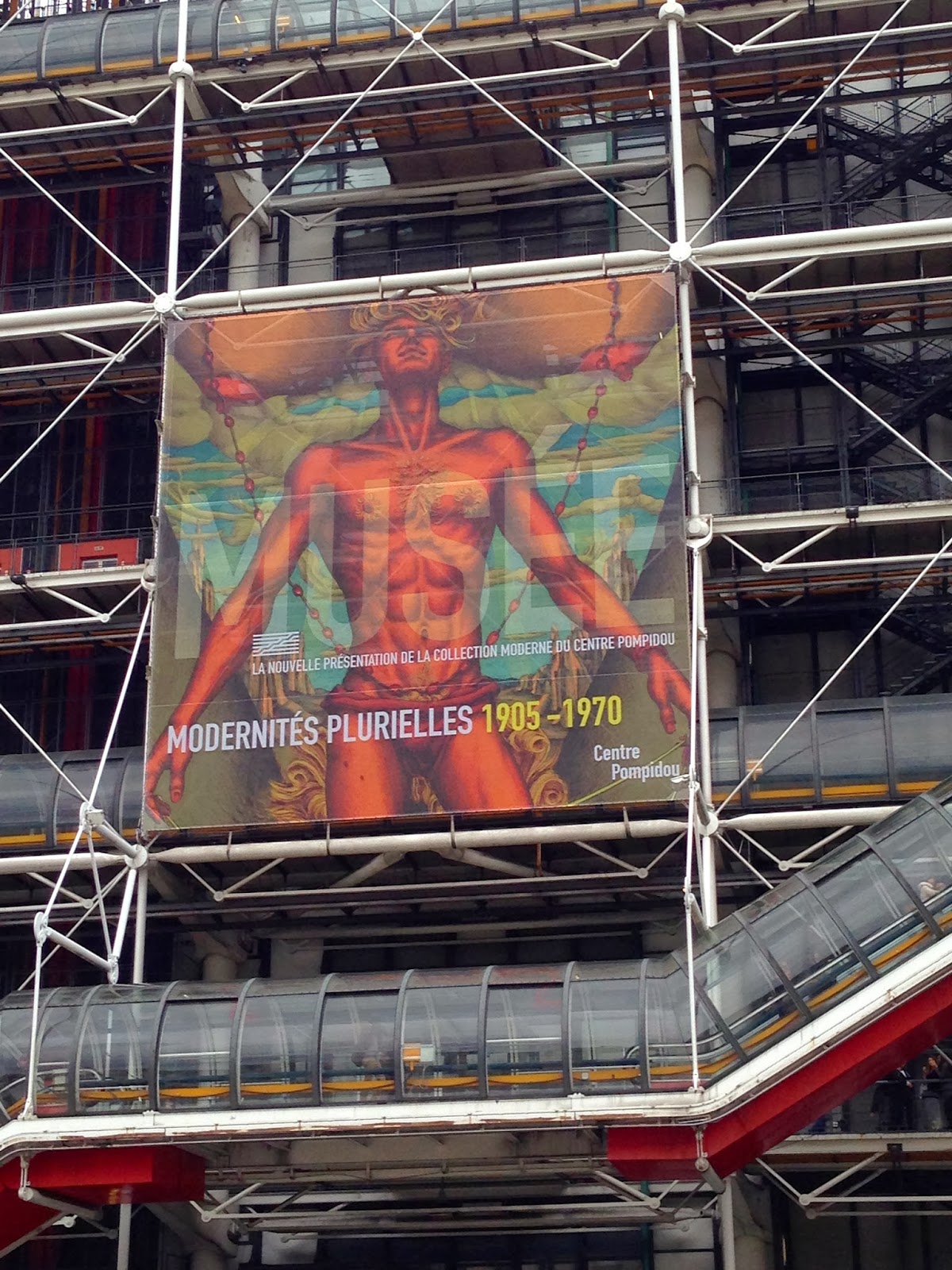RYTHMIC IN EVERY WAY
"Rythmes sans fin" explores the work of Robert Delaunay (1885-1941) during the Twenties and Thirties. I have always thought of him as one of the explorers of abstraction.
There were around 80 works in the form of paintings, drawings, reliefs, mosaics, models, a tapestry and a large number of documentary photographs. Thanks to the large donation made by Sonia Delaunay and her son Charles to the Musée National d’Art Moderne in 1964, the Centre Pompidou now possesses the world's largest collection of works by Robert and Sonia Delaunay. "Rythmes sans fin" explores his work after the war. Particularly after the Thirties, he regained an interest in mural painting, and extended his field to the modern environment by moving towards monumentality. No doubt about it, some of the paintings are big and in a small space, it is not always easy to back up from them.
The second part of the exhibition is devoted to the interior design projects that Delaunay (together with the architect Félix Aublet) created for the Palais des Chemins de Fer and the Palais de l’Air, and which caused a sensation at the International Exhibition of 1937. The building in itself is monumental and no longer exists today. Strange though, that very little is ever heard about it.
1930 marked a turning point. Robert Delaunay finally abandoned figurative painting – in particular the portraits of his friends that he had been producing (mainly for financial reasons).
He returned to his pre-war circular forms, eradicating every figurative reference from them. His brightly-coloured painting « Rythmes", « Joie de vivre » marks the transition towards the series Rythmes sans fin and Rythmes, still more radical pictorially, and emblematic of the works of his final years. The contrast between white and black structures the twisting movement comes to life on the surface. According to the artist, these works could
They seem to take up the spatial layout, as though prolonging the experience of walking around.
The Rythmes sans fin project rapidly moved beyond the medium of painting. In a letter to his friend Albert Gleizes, Delaunay said he was working "at full stretch" to develop new materials in every aspect of his work. The surfaces came alive through the play on textures, and the contrast between smooth and rough, or shiny and matt. These I really did like. Some were under glass so impossible to take photos of, due to the reflection.
Once upon a time, his Rhythms seemed to be very repetitive for me. Perhaps seeing them in a small collection along with the mural creations which I knew nothing about, made them easier to digest. There is an exhibition of his wife, Sonia, at the MAM which I plan to see as her work goes even further as she designed material for clothing and even household decoration. Seeing the two artists together though is a little too much. They are so look alike in my book, that I find it confusing. This was worth it though - especially as it was small.
 |
| Formes Circulaires, Soleil 2 -1912-13 |
There were around 80 works in the form of paintings, drawings, reliefs, mosaics, models, a tapestry and a large number of documentary photographs. Thanks to the large donation made by Sonia Delaunay and her son Charles to the Musée National d’Art Moderne in 1964, the Centre Pompidou now possesses the world's largest collection of works by Robert and Sonia Delaunay. "Rythmes sans fin" explores his work after the war. Particularly after the Thirties, he regained an interest in mural painting, and extended his field to the modern environment by moving towards monumentality. No doubt about it, some of the paintings are big and in a small space, it is not always easy to back up from them.
 |
| Manège de Cochons , 1922 |
 |
| Composition, 1935 |
 |
| La Ville de Paris 1937 |
 |
| La Tour Eiffel, 1926 |
The second part of the exhibition is devoted to the interior design projects that Delaunay (together with the architect Félix Aublet) created for the Palais des Chemins de Fer and the Palais de l’Air, and which caused a sensation at the International Exhibition of 1937. The building in itself is monumental and no longer exists today. Strange though, that very little is ever heard about it.
 |
| Helice et rythme, 1937 |
 |
| Félix Aublet:Art et Lumiere 1936-37 |
 |
| Inside the building |
 |
| From a little way off |
 |
| The map of discovery |
 |
 |
| Inside decoration |
 |
1930 marked a turning point. Robert Delaunay finally abandoned figurative painting – in particular the portraits of his friends that he had been producing (mainly for financial reasons).
 |
| Autoportrait 1905-06 |
 |
| Portrit de Mme Heim, 1926-27 |
He returned to his pre-war circular forms, eradicating every figurative reference from them. His brightly-coloured painting « Rythmes", « Joie de vivre » marks the transition towards the series Rythmes sans fin and Rythmes, still more radical pictorially, and emblematic of the works of his final years. The contrast between white and black structures the twisting movement comes to life on the surface. According to the artist, these works could
"combine intimately with architecture, while being architectonically constructed in themselves."
 |
| Rythm 1938/70 |
They seem to take up the spatial layout, as though prolonging the experience of walking around.
 |
| Decor for the Film Le P'tit Parigot de René Le Somptier, 1926 |
 |
| Rythme sans fin, 1934 |
The Rythmes sans fin project rapidly moved beyond the medium of painting. In a letter to his friend Albert Gleizes, Delaunay said he was working "at full stretch" to develop new materials in every aspect of his work. The surfaces came alive through the play on textures, and the contrast between smooth and rough, or shiny and matt. These I really did like. Some were under glass so impossible to take photos of, due to the reflection.
 |
| Football, 1918 |
 |
| Mosaique , 1935-37 |
 |
| Relief peint 1935 |
 |
| Composition, 1935 |
 |
| Mosaique 1935-37 |
 |
| Relief Gris , 1935 |
 |
| Relief blanc1935 |
Once upon a time, his Rhythms seemed to be very repetitive for me. Perhaps seeing them in a small collection along with the mural creations which I knew nothing about, made them easier to digest. There is an exhibition of his wife, Sonia, at the MAM which I plan to see as her work goes even further as she designed material for clothing and even household decoration. Seeing the two artists together though is a little too much. They are so look alike in my book, that I find it confusing. This was worth it though - especially as it was small.




Commentaires